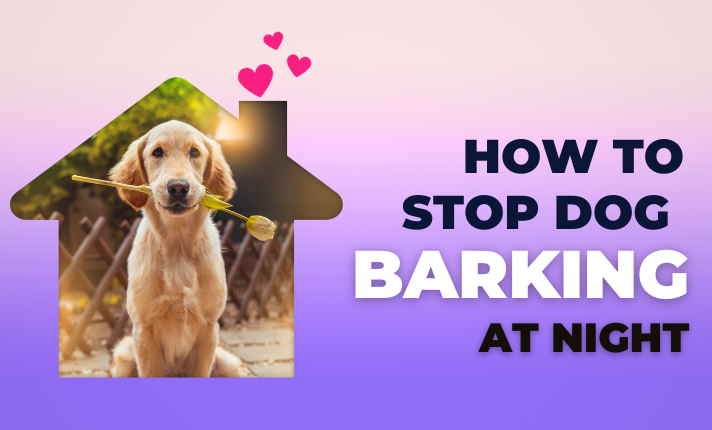How to Stop a Dog Barking at Night

The sound of a barking dog can quickly become a nuisance for families and disrupt peaceful nights of sleep. Dog owners may struggle to control their pup’s nighttime barking, but it is possible with the right tips and knowledge How to Stop a Dog Barking at Night. Understanding why dogs bark during the night and using positive reinforcement techniques are two great ways to help curb this behaviour. It is important to recognize that dogs have different needs and experiences, so what works for one pup may not work for another. With patience, understanding, and appreciation of your dog’s instincts, everyone in the home can enjoy a peaceful night’s sleep.
Dogs bark for several reasons; some may be due to threats, emotions, loneliness or discomfort. Threats could be from a neighbour’s dog or a nearby wild animal. Emotions such as excitement or fear can also lead to barking. Dogs are social animals and need companionship, so if they feel isolated and alone at night, they may bark out of loneliness. Finally, physical discomfort, such as hunger or thirst, can cause them to bark excessively. It is important to identify why your pup is barking before attempting to solve this issue. This article will provide useful tips on how to stop a dog barking at night, as well as discuss potential reasons behind the behaviour.
Quick Summary
All dogs bark, but excessive night barking can disrupt families. Reasons why a dog may bark at night can include fear, discomfort, loneliness or seeking attention. Crate training, exercise and mental stimulation can all help reduce your pup’s nighttime barking. Creating a safe and comfortable environment for your dog is also important in preventing excessive barking at night. If you understand the reasons behind your pup’s behaviour and use positive reinforcement techniques to stop them from barking at night, everyone in the home can enjoy a peaceful sleep.
Why is My Dog Barking at Night?
For dogs, barking is a form of communication. They bark to express themselves, alert their owners of potential threats, and even out of boredom. Dogs may bark at night for various reasons, including fear, anxiety, loneliness or discomfort. Excessive barking can sometimes indicate something wrong with your pup’s well-being. It could also be caused by boredom or when seeking attention from their owner. It is important to assess their needs and surroundings to identify why your dog may be barking at night. If you can intervene and address the underlying cause, this will help reduce their nighttime barking. Some common causes of nighttime barking include strange sounds or scents, animals or people passing by, and seeking attention from their owner. Understanding why your dog is barking in the dark and providing reassurance and love to help them feel safe in their home is essential. If you cannot identify the cause of their behaviour, it is important to seek professional help from a veterinarian or animal behaviourist.
It is important to provide your pup with positive reinforcement when they are not barking at night, as this will help them understand that the behaviour is unacceptable. Creating a safe and comfortable environment for your dog can also help reduce their nighttime barking. This includes ensuring they have enough food and water, ensuring the temperature in the home is suitable, and providing soft bedding or a crate for them to sleep in. Additionally, ensuring that your pup gets plenty of exercise throughout the day is vital, as this will tire them out before bedtime. Mental stimulation is also essential; providing toys for them to play with or taking them for long walks during the day will help stimulate their minds and reduce boredom. Finally, showing appreciation when your pup displays the desired behaviour will help them understand that they are doing the right thing.
Is It Normal for Puppies to Bark at Night?
As new family members, puppies bark as they learn and adjust to their needs. Some puppy barking is normal; however, excessive barking can indicate that the pup needs help adjusting. Creating a comfortable and secure environment reduces nighttime barking in puppies. A sleeping area with plenty of toys and bedding can help them feel safe in their new home. Developing a routine for your pup will also help reduce their nighttime barking; crate training is one way in which you can do this. With patience, understanding and love from their owners, most puppies will stop excessive barking at night and get used to their new environment.
Can Crate Training Help Reduce My Dog’s Barking at Night?
Crate training may surprise some dog owners, but it is a great way to help reduce barking at night. Dogs feel most secure and safe in their own space as den animals by nature. Establishing a routine and providing them with their own crate is a great way to gain trust and comfort in their environment. This will also provide them with a place to rest, helping reduce the stress that can lead to excessive barking. When introducing your dog to crate training, it is important to ensure they have positive experiences; look out for signs of discomfort or distress during the process. With patience and consistency, crate training can be effective in many cases; however, it is important to remember that every dog is different and will respond differently to training.
Tips to Stop Your Dog Barking at Night
Are your dog’s barks keeping you and your neighbours up all night? If so, don’t worry. Five tips can help you stop your dog from barking excessively at night.
Exercise and Mental Stimulation
Give your pup plenty of physical and mental stimulation during the day. This will help tire them out before bedtime, making it less likely for them to bark excessively at night. There are lots of ways to provide mental stimulation, including activities, tricks, toys, and problem-solving skills like treat dispensing puzzles.
Establish a Sleeping Routine
Establishing a routine around sleeping will help your pup learn when it is time to rest. Make sure to have a dedicated bed area in your home, provide plenty of bedding, and establish a routine around feeding and walking before bedtime. Consistency is key here, and any issues with unpredictability will confuse the pup’s behaviour.
Use Positive Reinforcement
Positive reinforcement, such as treats and attention for silence, can be a great tool for training. Other tools can also help, such as white noise machines, music or a crate cover that can help reduce barking stimuli at night.
Consider Bark Collars
If all else fails, you may want to consider using Bark Collars or other similar devices. However, you should always consult a trainer or veterinarian first to ensure that these tools won’t cause any harm or distress to the pup.
Be Patient
This is an important one! No matter your chosen techniques, it will take time and patience before you start seeing results. Don’t give up too soon or change strategies too often, as this can worsen the problem.
Create a Calm Environment
Make sure to create a peaceful and quiet environment in your home, as this can help reduce stress levels that lead to excessive barking. You can do this by limiting noise and light, providing soothing music or white noise, and ensuring no sudden changes or surprises could startle the pup.
Keep Your Dog Occupied
Keeping your pup busy with various activities and toys throughout the day will help keep their minds active and exercise so they don’t feel lonely or bored at night. This will also give them an outlet for energy, which may stop them from barking excessively.
Create an Appropriate Space
Ensure your pup has space to relax and feel secure. This can be a crate, kennel or just a spot in the house where they feel safe and cosy. Having their own space will help them feel more at ease during the night and stop them from barking unnecessarily.
These tips should help you stop your dog from barking excessively at night. Remember to be patient; it may take some time before you start seeing results, but with consistency and dedication, you should soon have a peaceful night’s sleep again!
Final words
Dogs are a great companion for many pet owners, but they can become a nuisance to neighbours when excessive barking occurs. Dog owners must be aware of signs that their pup may have issues with barking and address them as soon as possible. Establishing routines such as exercise, training, playtime, and sleeping areas will help create relaxation and reduce the chances of barking episodes. A range of anti-barking tools are also available, such as bark collars or sound machines, which can help with this type of behaviour. Many dogs need more attention, exercise and understanding of their training needs to stop excessive barking. Everyone’s dog has different reasons for why they bark at night, so it.’



